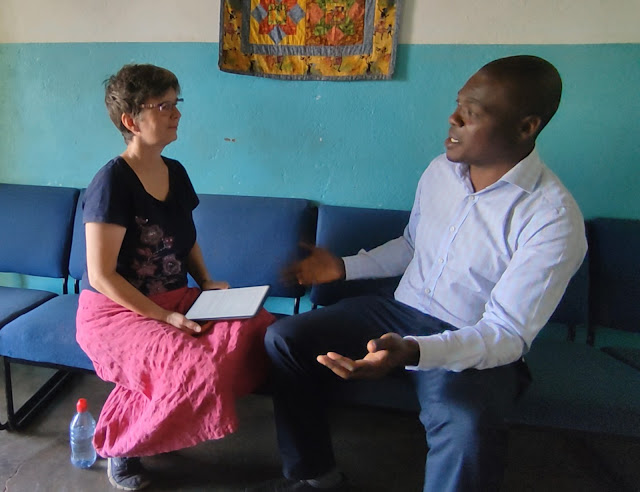
I hadn't heard the expression "food security" before visiting Home of Hope. Nothing to do with comfort-eating, by the way. It's the mindset you need when you've got 700 mouths to feed in a country where hunger stalks most families for months of the year at a time. The period before harvest, when village grain stores sit long empty - it's called the Hungry Season.
So when we visit the Home's farm land, bumping along in the much loved blue farm truck, it's not the mesmerising views of misted wooded hills sprouting from the plain we're here to see - achingly beautiful though they are. At this time of year we've learned to appreciate the beauty of land made ready to plant for maize in October, and the significance of irrigated out-of season beans.

Workers will plant well-spaced maize seeds, dress with carefully aimed fertiliser (there’s a serious move in the country towards soil-improvement using animal manure: we’ll get there) - then, just add water. When the rains come on time and don’t outstay their welcome, these fields are high with green spears in Jan/Feb, and yellowed ready for harvest by March.
“Feeding is our number one responsibility,” says Rev Chipeta - as he often has before. “These children can’t grow up strong and learn well without food - good food.” Yesterday’s vision-setting meeting captured several urgent points (things we want to see within one year) - uppermost for the farms the increased production of protein-rich foods: cattle and goats for meat,

(the Chipeta’s farm already manages small herds, which graze the land and are good for the soil)
setting more land to beans, and reviving the fish-ponds above the Home at the foot of the mountain.
After lunch Joseph Chipeta took us up there to see for ourselves what’s possible.
“We have eight or nine ponds, but they’re not actively managed. Only a few wild fish are in there right now. We can get these ponds going again, and have fish to harvest within only a few months.” Ruth asked more questions of Joseph which we recorded: interview video to follow after we have a chance to add subtitles. (It was windy up there and not every word is clear.)
If resources can be directed here, the returns will be high.
Nearby on the slopes above the Home are gardens cultivating irrigated vegetables. The children are able to enjoy veg with their nsima almost all year round, regardless of price spikes at the market in town.

Through Malawi Orphan Fund, donations within the last few years have provided pipes and pumps to test the idea of out-of-season harvests. It’s no longer an experiment.
Turn around, and you’ll see infant trees around a rush-sided hut. These are precious babies: little macadamia nut trees. Malawi has some of the best land for macadamia cultivation.
Our friend Andrew Emmott of Nut Cellars and his colleague Ken Mkangala introduced a tree nursery here some years ago, after visiting Home of Hope. The Home’s nurserymen have proved highly effective at the grafting process required to propagate macadamia (fruiting trees will not grow from seed).

Ruth and Phil brought a few jars of “macadamia butter” and other things delicious, produced in the UK by Nut Cellars from imported Malawian macadamia. (Is this sounding like a plug? That’s because it’s a plug ;) They wanted the nurserymen to see examples of what is being made elsewhere from commercial quantities of nuts. Closer to home, a relatively small number of mature fruiting trees can mean financial independence for a farming family - and increased food security. At our Vision meeting, Rev Chipeta announced the setting aside of more land for the trees, as a source of high-grade protein for the children, and perhaps as a revenue generator, too. Next steps include inviting Ken to conduct a thorough soil survey. Macadamia trees are themselves fussy eaters!
Earlier in the day Ruth and I met as planned with Edgar, the Secondary School Head Teacher.
Ruth finished by asking about his hopes for the school and its learners.
“We hope that, with time, we should be able to produce some of the most responsible and successful citizens in the country. We know it’s very possible. We can make them the best. At the same time, once they are successful, they should be able to support their families well, and if possible they should also be able to support this place. We are trying to make this place, our school, one of the best…”
We’re growing the future of Malawi here, it seems.
Last word to the land. This beautiful, beautiful land.















Comments
Post a Comment